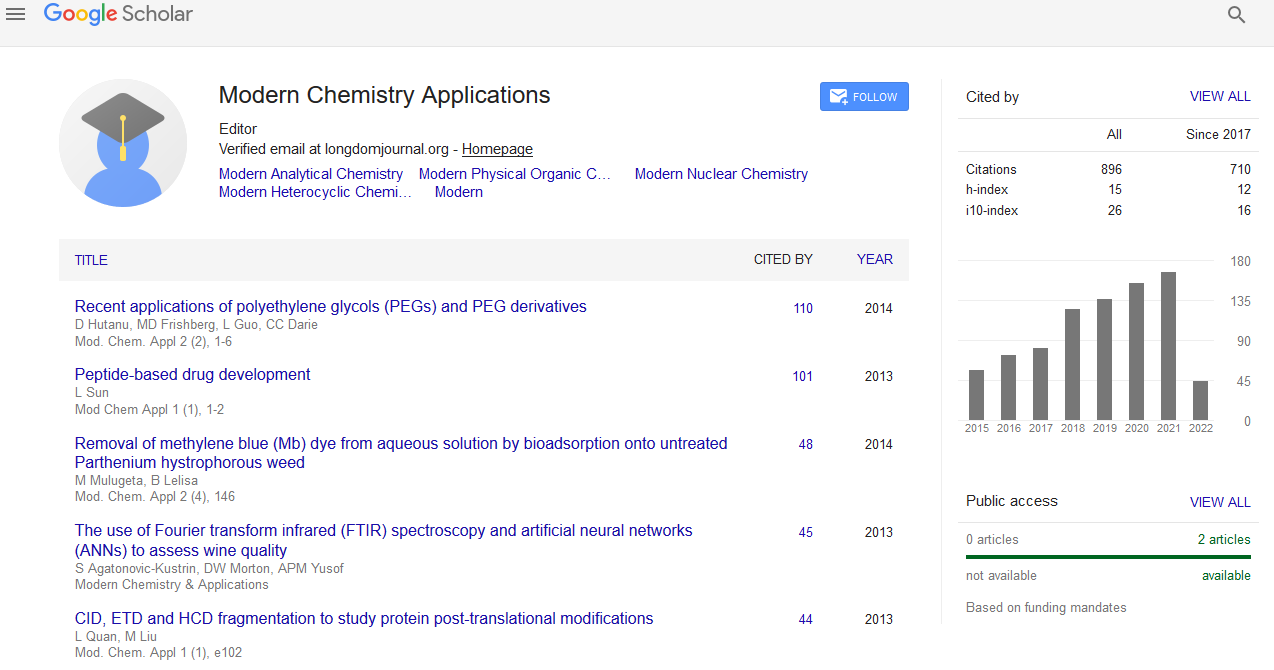Indexed In
- Open J Gate
- JournalTOCs
- RefSeek
- Hamdard University
- EBSCO A-Z
- OCLC- WorldCat
- Scholarsteer
- Publons
- Geneva Foundation for Medical Education and Research
- Google Scholar
Useful Links
Share This Page
Journal Flyer

Open Access Journals
- Agri and Aquaculture
- Biochemistry
- Bioinformatics & Systems Biology
- Business & Management
- Chemistry
- Clinical Sciences
- Engineering
- Food & Nutrition
- General Science
- Genetics & Molecular Biology
- Immunology & Microbiology
- Medical Sciences
- Neuroscience & Psychology
- Nursing & Health Care
- Pharmaceutical Sciences
Short Communication - (2024) Volume 12, Issue 2
Harvesting Resilience: Building Sustainable Horizons for Future Generations
Roger Nadeem*Received: 01-May-2024, Manuscript No. MCA-24-26322; Editor assigned: 03-May-2024, Pre QC No. MCA-24-26322 (PQ); Reviewed: 17-May-2024, QC No. MCA-24-26322; Revised: 24-May-2024, Manuscript No. MCA-24-26322 (R); Published: 31-May-2024, DOI: 10.35248/ 2329-6798.24.12.469
Description
The transformative potential of decentralized power grids and renewable energy sources in fostering resilience against climate change and enhancing sustainability. This radical change promotes local economic growth, reduces reliance on fossil fuels, and mitigates environmental impacts. By decentralizing power generation, communities bolster energy security and adaptability to natural disasters. Overcoming regulatory hurdles and investing in technology are critical for realizing these benefits. This approach not only addresses immediate energy needs but also lays a robust foundation for equitable, resilient societies capable of growing amidst global challenges [1-2].
The idea of harvesting resilience has become a spark of hope in a time when concerns about climate change and the commitment of sustainable development are the dominant themes. The construction of long-lasting, sustainable vistas is required by this paradigm shift in order to secure a successful future for future generations. The understanding of the limited resources on our earth and the pressing need to switch to renewable energy sources are at the core of this movement. This problem has a possible answer in the form of decentralised power grids connected to renewable energy sources, which provide a blueprint for creating horizons that are resilient and sustainable [3,4].
Imagine living in a society where people use renewable energy sources like the sun, wind, and other natural resources to create their own energy. This decentralised strategy improves energy security, stimulates local economic growth, and lessens dependency on fossil fuels. They can lessen the effects of climate change and provide the groundwork for a more just and sustainable future by making investments in renewable energy infrastructure. Enhancing resilience against natural catastrophes and other disturbances is one of the main benefits of decentralised power networks. Decentralised grids disperse power generation among several nodes, lowering the possibility of widespread outages, in contrast to centralised systems that are susceptible to single points of failure [5-8]. This resilience is essential in a society where extreme weather and other calamities are becoming more common.
The move to decentralised electricity systems can be seen as a microcosm of the larger movement towards sustainability. It forces them to reconsider how they relate to energy, realising that it is a vital component of human civilization rather than merely a good that can be purchased and sold. They can create the foundation for a future that is more resilient, egalitarian, and sustainable by embracing renewable energy sources and decentralising power generation. Harvesting resilience has advantages that go well beyond the energy sector. They provide chances for innovation, job creation, and community empowerment by expanding sustainable horizons. To protect the earth for coming generations, they also lessen our carbon footprint and lessen the effects of climate change [9].
Benefits of decentralization
Decentralized power grids offer numerous advantages over centralized systems. They enhance energy security by reducing reliance on distant power plants and long-distance transmission lines, which are vulnerable to disruptions. Decentralization also fosters local economic development by promoting entrepreneurship and job creation in the renewable energy sector.
Resilience in the face of disruptions
Decentralized grids are inherently more resilient to natural disasters, cyberattacks, and other disruptions than centralized systems. With power generation distributed across multiple sites, the failure of one node does not lead to widespread outages. This resilience is crucial for maintaining essential services during emergencies and ensuring community well-being.
Challenges and solutions
Despite their potential benefits, transitioning to decentralized power grids poses several challenges. These include regulatory barriers, limited access to financing, and technical constraints.Overcoming these obstacles requires collaboration between government agencies, utilities, communities, and technology providers to create supportive policies, streamline permitting processes, and invest in research and development [10].
Environmental and social benefits
Transitioning to decentralized power grids has numerous environmental and social benefits. By reducing dependence on fossil fuels, decentralized grids help mitigate air and water pollution, protect ecosystems, and combat climate change. They also promote energy equity by expanding access to clean, affordable energy services, particularly in underserved communities.
Conclusion
All things considered, "Harvesting resilience" captures the revolutionary possibilities of decentralised power networks connected to renewable energy sources. We can create sustainable vistas that guarantee future generations a wealthy and resilient future by adopting these technologies and method.
References
- Mir N, Bicer Y Integration of electrodialysis with renewable energy sources for sustainable freshwater production: A review. J Environ Manage. 2021;289:112496.
[Crossref] [Google Scholar] [PubMed]
- Panagopoulos A. Water-energy nexus: desalination technologies and renewable energy sources. Environ Sci Pollut Res Int. 2021;28(17):21009-22.
[Crossref] [Google Scholar] [PubMed]
- Carmona B, Abejón R. Innovative membrane technologies for the treatment of wastewater polluted with heavy metals: perspective of the potential of electrodialysis, membrane distillation, and forward osmosis from a bibliometric analysis. Membranes (Basel). 2023;13(4):385.
[Crossref] [Google Scholar] [PubMed]
- Xie M, Shon HK, Gray SR, Elimelech M. Membrane-based processes for wastewater nutrient recovery: Technology, challenges, and future direction. Water Res. 2016;89:210-221.
[Crossref] [Google Scholar] [PubMed]
- Bhatti HJ, Danilovic M. Making the world more sustainable: enabling localized energy generation and distribution on decentralized smart grid systems. World Journal of Engineering and Technology. 2018;6(2):350-82.
[Google Scholar] [PubMed]
- Hossain E, Roy S, Mohammad N, Nawar N, Dipta DR. Metrics and enhancement strategies for grid resilience and reliability during natural disasters. Applied energy. 2021;290:116709.
- Michaels L, Parag Y. Motivations and barriers to integrating ‘prosuming’services into the future decentralized electricity grid: Findings from Israel. Energy Research & Social Science. 2016 Nov 1;21:70-83.
- Dile YT, Karlberg L, Temesgen M, Rockström J. The role of water harvesting to achieve sustainable agricultural intensification and resilience against water related shocks in sub-Saharan Africa. Agriculture, ecosystems & environment. 2013;181:69-79.
- Craddock D. Renewable energy made easy: free energy from solar, wind, hydropower, and other alternative energy sources. Atlantic Publishing Company; 2008.
- Yanine FF, Caballero FI, Sauma EE, Córdova FM. Building sustainable energy systems: Homeostatic control of grid-connected microgrids, as a means to reconcile power supply and energy demand response management. Renewable and Sustainable Energy Reviews. 2014;40:1168-91.
Citation: Nadeem R (2024) Harvesting Resilience: Building Sustainable Horizons for future Generations. Modern Chem Appl. 12:469.
Copyright: © 2024 Nadeem R. This is an open access article distributed under the terms of the Creative Commons Attribution License, which permits unrestricted use, distribution, and reproduction in any medium, provided the original author and source are credited.


